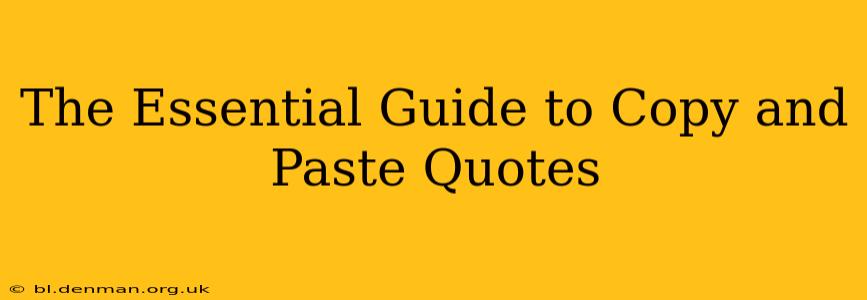In today's digital world, the ease of copying and pasting quotes has revolutionized research and writing. However, this convenience often comes with pitfalls. This comprehensive guide delves into the essential aspects of accurately copying, pasting, and properly attributing quotes, ensuring you avoid plagiarism and ethical breaches. We'll cover everything from finding reliable sources to understanding copyright law.
What are the potential problems with copying and pasting quotes?
The biggest risk associated with simply copying and pasting quotes is plagiarism. Even if unintentional, presenting someone else's words as your own can have severe academic and professional consequences. Beyond plagiarism, inaccurate copying can distort the original meaning, leading to misinterpretations and flawed arguments in your work. Finally, failing to properly attribute the quote can damage your credibility and raise questions about your ethical standards.
How can I accurately copy and paste a quote?
Accuracy is paramount. Before you copy and paste, carefully read the quote in its original context. Verify the spelling, punctuation, and capitalization. If you need to make any alterations (e.g., ellipses to remove unnecessary words), indicate these changes clearly. Consider these best practices:
- Double-check: Always compare your copied quote to the original source. Even minor errors can change the meaning.
- Use quotation marks: Enclose the entire quote within quotation marks ("...").
- Maintain formatting: Preserve the original formatting (italics, bold, etc.) unless absolutely necessary to adjust for your document's style.
- Use ellipses (...): If you omit words or sentences, use ellipses to indicate the omission. However, avoid altering the original meaning.
- Use brackets [ ]: For any changes or clarifications you add to the quote, such as explaining an obscure reference, enclose these additions in square brackets.
What is the proper way to cite a quote?
Proper citation is crucial for avoiding plagiarism and giving credit where it's due. The specific citation format will depend on the style guide you're following (MLA, APA, Chicago, etc.). Regardless of the style, always include:
- Author's name: The person or organization that originally wrote or spoke the quote.
- Publication details: The source where the quote appeared (book title, journal name, website URL, etc.).
- Date of publication: When the source was published.
- Page number (if applicable): For printed sources, specify the page number where the quote can be found.
How do copyright laws affect the use of quotes?
Copyright law protects the intellectual property of authors. While you can generally quote copyrighted material for educational or critical purposes (fair use), excessive quoting or using a quote for commercial gain without permission can lead to legal issues. Fair use generally considers factors such as:
- Purpose and character of the use: Is it educational, transformative, or commercial?
- Nature of the copyrighted work: Is it factual or creative?
- Amount and substantiality of the portion used: How much of the original work are you quoting?
- Effect of the use upon the potential market: Does your use harm the market for the original work?
What are the ethical considerations when quoting?
Beyond legal concerns, ethical considerations are paramount. Always strive for transparency and integrity. Avoid taking quotes out of context to support a misleading argument. Acknowledge any alterations made to the quote and ensure your citation is accurate and complete. Transparency and respect for the original author are fundamental to ethical quoting.
How can I avoid plagiarism when using quotes?
The best way to avoid plagiarism is through meticulous attention to detail. Always cite your sources correctly, accurately reproduce the quote, and avoid using too many quotes without your own analysis. Paraphrasing and summarizing information, while properly cited, can be a beneficial way to integrate external ideas into your work while minimizing direct quotes.
What are some common mistakes to avoid when quoting?
- Inaccurate transcription: Misspelling, omitting words, or changing punctuation.
- Improper attribution: Failing to cite the source correctly or omitting necessary details.
- Quoting out of context: Distorting the meaning of the quote by removing surrounding text.
- Over-reliance on quotes: Using too many quotes without sufficient original analysis or commentary.
By carefully following these guidelines, you can effectively and ethically incorporate quotes into your writing, enhancing your work's credibility and avoiding potential legal and ethical issues. Remember, responsible quoting is not just about avoiding trouble; it's about showcasing your academic and professional integrity.

